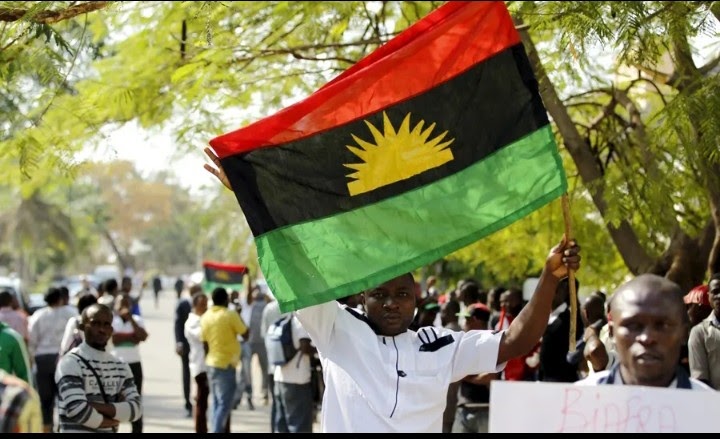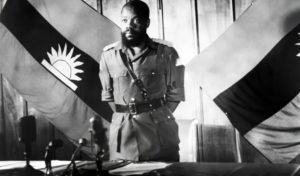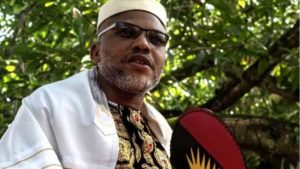
In 1967, Chukwuemeka Odumegwu Ojukwu, a 33-year-old Lieutenant-Colonel in the Nigerian Army, announced the secession of Nigeria’s Southeast region from the rest of the country, following a pogrom that killed about 30,000 Southeastern Nigerians living in Northern Nigeria with about a million of them fleeing back to the then eastern region.
The Nigerian government declared the secession as illegal and went to war with the newly formed Republic of Biafra.

After 30 months of fighting, following a Biafran surrender, the Nigerian Head of State, Yakubu Gowon declared the war as having “no victor, no vanquished.” The war ended officially on Jan. 15, 1970.
The aftermath of the war saw the easterners, predominantly Igbos, face serious economic devastation just as the post-war “era saw a ‘unified’ Nigeria saddled with a greater and more insidious reality,” Chinua Achebe, renowned novelist wrote in his controversial memoir, There Was A Country.
Echoes of the past
With Nigeria’s currently fragmented political landscape, many Igbos till this day continue to believe they have always been at a disadvantage in Nigeria.
Achebe wrote that after the war, “the Igbo were not and continue not to be reintegrated into Nigeria, one of the main reasons for the country’s continued backwardness, in my estimation.”
Tensions in the region have been high because of perceived marginalisation in governance and economic resources. The region has yet to produce a president since the start of Nigeria’s fourth republic in 1999.
“Even for those who did not witness the war, the handed-down narrative of the Igbo not being reintegrated fully into the political space resonates what they see play out in the current time,” said Jasper Ukachukwu, the team lead of Peace and Conflict unit of the Centre for Democracy and Development (CDD), an Abuja-based think-tank.
Ukachukwu says the calls for self-determination have simmered over again because of this.
In 1999 when Nigeria returned to democracy after a series of military takeovers, the separatist spirit was reinvigorated with the formation of the Movement for the Actualisation of the Sovereign State of Biafra (MASSOB) by Ralph Uwazurike.
The group was resisted by the Olusegun Obasanjo administration when it introduced the Biafran pound in 2005, and by the Goodluck Jonathan government following the launch of the Biafran passport in 2009.
Subsequently, Uwazurike and his supporters were arrested. In 2013, Jonathan, Nigerian president at the time designated MASSOB a terrorist group alongside Boko Haram, leading to the group’s passivity, according to Cheta Nwanze, a researcher at Lagos-based SBM Intelligence.
The birth of IPOB
Reinvigorating the secessionist movement, Nnamdi Kanu, a Nigerian-British citizen living in the United Kingdom, formed the Indigenous People of Biafra (IPOB) and launched Radio Biafra to promote Biafran agenda in 2012.

Kanu’s IPOB first started as a charity organisation, providing legal aid to persecuted pro-Biafran supporters. In 2015 when Nigerian President Muhammadu Buhari, from the Northwest region, came into power, IPOB gained traction after accusing the president of being an ethnic bigot.
The movement has equally been met with government repression. Hostilities between the group and security forces have grown since 2016.
According to human rights group Amnesty International, more than 150 IPOB supporters were killed by security forces during a May 30 Biafra Day celebration in 2016. But the Nigerian Army said Amnesty was trying to tarnish its reputation.
In 2017, Kanu was arrested when he visited Nigeria and was forced to a self-imposed exile to escape state forces. The same year, Buhari declared the separatist group a terrorist organisation and unleashed a military offensive in the region.
Experts say the government’s kinetic approaches are radicalising and emboldening the separatist group’s militarisation in the region and neighbouring South-south.
Police formations and personnel have been targeted for attacks by suspected IPOB members in the regions since 202o, leading to a deteriorating security situation.
Since the beginning of 2021, attacks have escalated and expanded to INEC offices, courts and other government institutions.
In the twin attack on police headquarters and correctional facility in Imo state in April 2021, the armed gang looted police armoury and torched the buildings, a pattern similar to Boko Haram trend at its infancy when attacks were primarily to gather large caches of arms from the state armoury and dislodge trust in the security forces and government institutions.
The police, in a preliminary report, blamed attacks on IPOB. But the separatist group rejected the accusations, saying “it is not our mandate to attack security personnel or prison facilities.”
Although in August 2020, when the police stormed an IPOB meeting and killed more than 21 people including two members of the group in Enugu State, the group promised retaliation and urged its members to practise self-defence.
In Dec. 2020, IPOB launched its armed wing, dubbed the Eastern Security Network (ESN) to ‘protect’ the region against criminal herders accused of illegally grazing on farmlands and committing crimes. The crisis has since worn an inter-ethnic attire because many known herders are from northern Nigeria.
But a report by TheCable found that killings tripled in the region after the launch of ESN, raising concerns about whether the security outfit has degenerated into a militia leading an insurgency similar to Boko Haram in the northeast.
Nwanze says the separatist group tried to fill a security vacuum that the state governments could not address.
In April 2021, the southeast governors after a security summit banned open grazing and launched a security network dubbed “Ebube Agu,” fashioned after the southwest security outfit, Amotekun which was launched early 2020 and adopted by all states in the region to address rising kidnapping cases and communal clashes.
“Up until now, no South-east governor has even sent a bill for Ebube Agu to his assembly. Utterly useless,” Nwanze told HumAngle.
Ukachukwu believes the deteriorating security in the southeast is not unrelated to the alarming unemployment rate among the youth in the region who have ardently identified with the movement.
According to data from the National Bureau of Statistics (NBS), Imo State, the epicentre of the crisis, recorded the highest rate of unemployment (56.64 per cent) by the end of 2020.
When Kanu announced a sit-at-home order to commemorate the Biafra Remembrance Day on May 30, young persons, suspected to be IPOB members, went around states to ensure compliance. It was largely complied with as footage online showed abandoned streets but this also came with the use of force by suspected IPOB/ESN members on those who flouted the order.
To some pro-peace voices like Chiamaka Okafor, a political commentator, the crisis is both unsettling and frightening.
“It is quite personal for me because I have seen this in the northeast. It is sad we are letting this bad history repeat itself. Now, the northeast is almost inhabitable. We have an ample opportunity to nip this in the bud but unfortunately, our leaders are being blind to this,” Okafor told HumAngle.
What way to go?
President Buhari on Tuesday, June 1, 2021, threatened to use force on perpetrators of attacks on government institutions, especially the burning down of offices of the country’s election umpire, Independent National Electoral Commission (INEC) in the Southeast and South-south regions.
As Nigeria heads toward elections in 2023, there are concerns that the unfolding conflict might just become too fully blown to control.
Already, there are reports of human rights abuses on innocent people by the security forces amidst efforts to tame the crisis.
Nigerian Army has been accused of rounding up innocent residents including students of Imo state university, parading them as ESN members.
In a viral footage that surfaced on the Biafra remembrance day, a group of men whom the military and Nigeria Police alleged were IPOB/ESN were degraded out of a church.
According to Sahara Reporters, a report by the International Society for Civil Liberties and Rule of Law, a civil society and research group, detailed some of the accounts of these victims of army and police harassment and provided their photographs.
On handling the security situation, Ukachukwu advocates a counterinsurgency approach with a political dimension that gives room for dialogue.
“Nigerian government must uphold civility in handling security issues. It is time the government realised that kinetic approaches to handling conflicts are not the only way out. It has shown in the manner it handled Boko Haram insurgency,” Ukachukwu said.
Okafor also preaches that a peace deal must be reached between the Nigerian government and IPOB separatists.
Support Our Journalism
There are millions of ordinary people affected by conflict in Africa whose stories are missing in the mainstream media. HumAngle is determined to tell those challenging and under-reported stories, hoping that the people impacted by these conflicts will find the safety and security they deserve.
To ensure that we continue to provide public service coverage, we have a small favour to ask you. We want you to be part of our journalistic endeavour by contributing a token to us.
Your donation will further promote a robust, free, and independent media.
Donate HereStay Closer To The Stories That Matter




